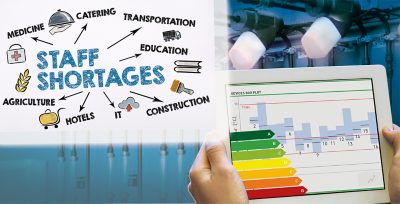Effective Water Management Plan Compliance During A Labor Shortage And Beyond
Automation can help tackle labor shortages by replacing repetitive tasks associated with water management. Use technology to improve control measures, optimize performance, reduce liability risks and increase labor savings.
Finding skilled workers has been an issue businesses have dealt with for years. But companies have been surprised to find that despite many new job openings, applications have been slow in coming. Businesses are posting more job openings than ever, but hiring isn’t keeping pace, leading to concerns among many employers about their ability to find workers. Leaving existing employees overworked while employers are facing declines in efficiency, quality, performance, and production. In healthcare, efficiency and performance are vital to protecting the lives of the patients, nurses, doctors, and staff.
Worker shortages affect WMP compliance and increase liability
At the recent ASHE PDC summit in New Orleans, I asked many of the attendees, facility managers, and engineers, how are they handling their water management plan (WMP) requirements. In most of their responses, they stated that these tasks are performed manually, however, with the shortage of skilled labor some critical processes can get overlooked such as temperature monitoring, routine flushing, and properly documenting the system status. This type of neglect is common with most tasks assigned to humans.
Inconsistent implementation of key control measures or monitoring of control limits leads to increased liability. When tasks are not performed at scheduled times it increases the risks associated with building water systems. Add to that, poor documentation, and a facility could find itself shorthanded during legal proceedings.
Automating key WMP requirements guarantees consistency and efficiency
As detailed in the article How Building Automation Is Changing Healthcare Facilities Management , the healthcare industry has used innovation in automation to improve building management and operations. Building automation is currently used in hospitals to manage HVAC and lighting systems, building security and access control, video surveillance, intercom systems, mass notifications, and even fire systems which can monitor temperatures and provide early notifications when a fire occurs. Missing from this article is any mention of automation in plumbing systems. However, with the continued rise of Legionnaires' disease outbreaks, growing requirements to implement an ASHRAE 188 compliant water management plan, and the labor challenges that hospitals are facing the need for intelligent, automated plumbing systems is at an all-time high.
By increasing automation, hospitals can increase efficiency without the need to increase staff. Simply put, automation means taking routine and repetitive tasks and making them automatic, so that the extra time saved in the process can be diverted elsewhere. The initial costs associated with installing an automated system is offset by the added value it brings. The system cost is also static whereas operational costs associated with the increased labor cost of repetitive tasks is not.
GF's Hycleen™ Automation System simplifies WMP compliance and reduces the risk of liability
Hycleen is a fully integrated, state-of-the-art hydraulic control and water management system able to automate control measures, monitor control limits, and provide detailed documentation and reporting.
The system uses numerous flavors of automation, ranging from intelligent automation (which involves the use of machine learning) to monitor and control the system, to pseudo automation (which turns pen-and-paper tasks into digital ones) by logging and documenting the processes.
GF's Hycleen™ Automation System is scalable and customizable which is great for implementing an addition to a facility's water system knowing there will be no loss to the efficiency and operations of the entire system. Such efficiency is critical to optimize energy and water savings.
Whether you have one facility or multiple, everything can be controlled from one location with minimal human interaction freeing the staff to do other tasks that can’t be automated. Packaging these features into one system for water management compliance is critical in today’s worker shortage environment.
GF Piping Systems
GF Piping Systems is committed to providing efficient, reliable, innovative, and sustainable solutions to meet the rigorous demands of healthcare water systems.
Visit us at www.gfps.com/us/healthcare to learn more.
 By increasing automation, hospitals can increase efficiency without the need to increase staff.
By increasing automation, hospitals can increase efficiency without the need to increase staff.
- 0